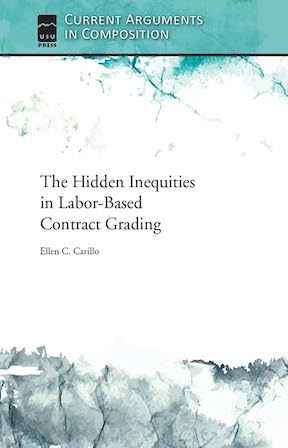

We (Sarah, Joe, and Jacob) welcome you to our multimodal book review of Ellen C. Carillo's (2021) The Hidden Inequities of Labor-Based Contract Grading! We are excited to share our thoughts on and interpretations of this book as teacher–scholars and to begin a conversation which will hopefully spur discussion with your colleagues, programs, and institutions, or which will help you (re)think about your assessment practices.
Our original conversation has been edited down to about half an hour of content, split across three sections: Assumptions About Contract Grading, Disabilities and Contract Grading, and Flexibility and Engagement. You'll find audio files of our thoughts, as well as transcripts of the recordings. Finally, you can read our reflections on the process of creating a multimodal book review. Our goal with this review was to have a casual dialogue focused on how we think about (and with) Carillo's work in our teaching, and we hope it will aid you in doing the same, whether you are a seasoned veteran or completely new to alternative assessment!
Jacob: What I found lovely about the experience of a collaborative book review is that it encouraged me to think differently about the book and not just from my own position: instead, to intrinsically consider the book from the views of others in different situations. This led me to have a different perspective than I did when I first encountered this text last year and was only thinking of its applicability to me. I also found that the question-and-answer format we employed was beneficial because others noticed things which I had not, or framed questions in ways I wasn't thinking about. The collaborative element was akin to being in a grad class again for that reason.
The multimodal aspect was simultaneously what got me to agree to do the review but also the anxiety-inducing part. Writing a book review is easy—figuring out how to convert that into something multimodal was a lot more difficult, especially in the early stages. I think we faced the same issue that undergraduate students do when we ask them to do multimodal projects—"how am I supposed to do this without someone showing me exactly how to do this?"—and had the same realization as them: that there is sometimes no better practice for learning than simply taking the risk to try something new. Ultimately, our biggest hurdle wasn't doing multimodality but actually learning and using multiple technologies, which do not especially provide affordances for what we wanted to do, leading to creativity and resilience on our end.
Sarah: There was something about the combination of Kairos's invitation to do podcast reviews and doing so for Carillo's specific book that clicked for me. It immediately felt natural to talk contract grading (much like I had done at conferences or with colleagues and students in my writing program) rather than to write contract grading. Part of this impulse comes from the topic itself. Grading contracts are described and negotiated with our students who have not encountered this form of assessment before. They are discussed with our colleagues in a never-ending attempt to construct the perfect contract. They are the spark of passionate debates and conversations at faculty meetings and conferences. I spend more time talking about grading contracts with students and colleagues than I do with any other aspect of my courses. It is not surprising, then, that reading Carillo's book for the first time sent me into a talkative frenzy with anyone who would listen on how we had to heed Carillo's recommendations and thoroughly revise our contracts. A podcast review was a natural extension of that oral process of creating and recreating our classroom and assessment practices through theory- and practice-informed conversations.
Joe: Just knowing beforehand that it would result in an audio product was very helpful for me in conceptualizing why we were even doing this. I recently had a conventional text-based review of Power Despite Precarity by Joe Berry and Helena Worthen (2021) published in Academic Labor: Research and Artistry (Schicke, 2023). The process of reading for and writing that review was fine. No real complaints, but writing that review felt more abstract and disembodied. There was something artificial in between my thoughts and my fingers typing. That's not a comment on the wonderful book or journal I was writing about and for. It's a comment on the act of writing text versus using my voice. This review for Kairos felt natural. It was my voice, and I was getting the chance to shoot the shit with my friends about a topic that is dear to me. We had a rough outline of topics that we prepared in advance and used while recording, but I didn't write any of what I actually said. I'm sure that if I had written my portion, it would have been different. Maybe it would have been better, I don't know. But it would have been different. Speaking, I felt the same kind of wheels turning I feel when I'm writing, but knowing my colleagues were there on the other end of the line listening, and that I might suggest something they might want to talk about, changed the discourse I actually produced.
One concern I have is accessibility. I recently listened to a piece from Kairos called "Sight, Sound, & Practice" by Ben Lauren and Bill Hart-Davidson (2020) for a paper I'm writing. It's a great piece, but I was sitting outside at a coffee shop in Fort Collins listening on my laptop, which was not ideal. I wonder if listeners will have any difficulties finding a good space, and the time, to sit back and listen to our piece.
West Side Joe and The Men of Soul. (2021, July 29). Keep on climbin' (Official music video) [Video]. YouTube. https://youtu.be/07vZW-qRTRQ
OpenAI. (2023, October 29). ChatGPT [Large language model]. https://chat.openai.com/chat
Images provided by Unsplash and Pexels; book cover image courtesy of University Press of Colorado.